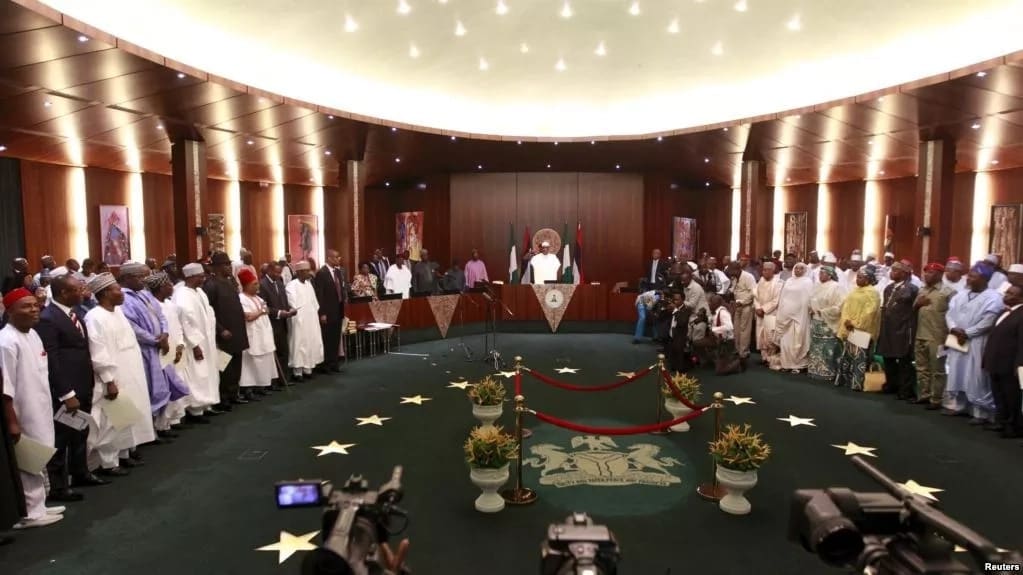
Inside Stuff With MARTINS OLOJA
It is his privilege to nominate anyone he likes. It is our right to examine the nominees and have our say. But as chief executive of the federation, he will have his way. In the same vein, it is still our responsibility as citizens to return our verdict on the quality of the cabinet this brand new senate will certainly clear tomorrow.
The President of the Senate as a candidate, pledged that the senate he would preside over, would not be a ‘rubber-stamp’. Indeed, he has set the tone for the kind of senate he will lead with the just-take-a-bow-and-go’ standard that has just been set.
I understand the president’s men are smiling (not to the bank please) that Senator Bukola is not even in the senate to ask why portfolios were not attached to the nomination as demanded four years ago – though without success.
Don’t get it twisted, this is a business-as-usual cabinet in the making – to take only the governing party’s followers to the next level. This cabinet, like the last one, cannot take the most populous black nation on earth to any glorious level.
But there is nothing we can do about it now. Alan Paton, author of ‘Cry the Beloved Country’ counsels the aggrieved at such a time like this: “when the storm threatens, , a man is afraid for his house, But when the house is destroyed, there is something to do. About a storm he can do nothing, but he can rebuild a house”.
President Buhari is like a storm here and so about him we can do nothing other than finding a way of rebuilding the nation from the rubble it is right now.
Just as a former Head of State, General Abdusalami Abubakar will be doing this week with a ‘National Dialogue’ in Minna, capital of Niger state.
If the National Assembly in Abuja were to be truly our people parliament, members would not have chosen to go on holiday at this time when a crisis of nationhood has hit the fan and country’s leadership appears clueless. What manner of representatives of the people would go on vacation and leave crisis management to a slow leader in a time of emergency? But Paton said, we can rebuild our house! Thank you General Abubabar for the ‘Mission in Minna’ for peace and reconciliation this week.
Meanwhile, I hope that the Chairman of the Joint Session of the National Assembly, the President of the Senate, Senator Ahmed Ibrahim Lawan is aware of public perception of the Senate as a tragicomedy already. Is the senate leadership aware that trouble began for the upper house when it could not screen well the first major nominee to it, the Chief Justice of the Federation? There was indeed some ‘technical mediocrity’ from the way the CJN nominee then, Justice Ibrahim Tanko Muhammad contextualised ‘technicality in law’. Why were there no follow-up questions when the Acting CJN who was being screened to be Chief Justice of Nigeria (CJN) could not explain what “technicality’ in contrast to ‘substance’ means in law? The slipshod manner the current senate screening of the ministerial nominees has been handled so far leaves a residue of sour taste in the mouth. The foundation of the mediocre screening was failure of the senate to demand for attachment of portfolios to the nominees. That failure aided the take-a-bow-and-go culture, which has been a public relations tragedy for the senate and indeed the nation.
No wonder last week Nigeria was among the low-middle income countries that were adjudged under-performing in the creation and utilisation of innovations, according to the 2019 Global Innovation Index (GII) just released.
While the shoddy senate screening was in progress on Wednesday last week, the GII noted that Africa’s largest economy performed below expectations compared with the level of economic development in the country. Other underperformers in the low-middle income group are Ghana, Zambia, El Salvador, Bolivia and Nicaragua. Nigeria only moved up four places to 114 out of 129 countries ranked in the 2019 GII from 118th position it attained in 2018.
Meanwhile, the top three economies in terms of innovation in sub-Saharan Africa are South Africa, Kenya and Mauritius. As Nigeria was missing among the innovation achievers in the continent, five countries, which emerged in terms of innovation relative to their level of development, from the sub-Saharan Africa are Kenya, Rwanda, Mozambique, Malawi and Madagascar.
This is why it is a sad commentary on Nigeria’s affairs that the powerhouse of innovation in a democracy, the parliament where policies and programmes are made through legislations, has just created the first two negative impressions.
Indubitably, the first sector to reform as far as innovation is concerned is education. Only quality in education makes the difference (in innovation) you find in the North America, Europe, Asia, (South Africa and Egypt) in Africa, etc. When last did our national assembly organise any special sessions on funding of qualitative higher education? When did any budget defence sessions become rowdy over disagreement on education quality, the only known weapon of country and global competitiveness?
What else can trigger innovation other than Research and Development’s (R&D’s) robust funding? Does Nigeria’s federal legislature have a functional library where their researchers can dig deep and collect data on the parlous state of education at all levels in Nigeria? Will innovative technologies flow from the many ministries and agencies that the president would want to fill with 43 ministerial nominees?
In 2017, there was a report that Google could not find well-equipped Computer Science Departments in any of the 170 universities in Nigeria and so had to take its Artificial Intelligence (AI) Centre to Ghana (with nine national public universities and three institutions in the Chartered private tertiary institutions category) where they found a university in Accra that could support it.
This is one setback that should set Nigeria’s representatives in the federal legislature thinking – about the next level of innovation. Not the next level of celebration of mediocrity we find everywhere despite 170 universities. It will be useful if the national assembly in Nigeria is used to ‘rubber-stamp’ robust reform in education that will lead Nigeria, our Nigeria to be a centre of excellence in Research and Development. I have been writing here that we need better, and not more universities. Will there be redemption songs for Senator Lawan and Hon. Gbajabiamila’s 9thAssembly Assembly? Only time will tell!

